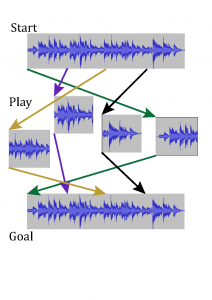Music appreciation/perception/enjoyment is not limited/restricted/impeded by hearing acuity that is measured by audiogram.
Since we understand there are many deaf and hard of hearing people who like music, we try to let them enjoy music more by improving hearing ability with music games.
Tapping game
“Tapping game” is an ear-training program for hearing impaired students which employs popular music (i.e. Japanese pop songs) and serious-game structure so that the students can enjoy and actively continue the training.
- Kano, N., Matsubara, M., Terasawa, H., and Hiraga, R.: The development and feasibility test of a tapping game for hearing-impaired college students, IPSJ Vol. 2014-MUS-104, No. 4, August 25, 2014. (Japanese)
- Matsubara, M., Terasawa, H., and Hiraga, R.: The effect of musical experience on rhythm perception for hearing-impaired undergraduates, 2014 IEEE International Conference on Systems, Man and Cybernetics, pp. 1666-1669, October 7, 2014. DOI: 10.1109/SMC.2014.6974155
- Kano, N., Matsubara, M., Terasawa, H., and Hiraga, R.: Development and short-term evaluation of tapping game for hearing-impaired students, RPPW15, p. 61.
- Kano, N., Matsubara, M., Terasawa, H., and Hiraga, R.: Investigation about hearing-impaired people’s rhythm-cognition ability by means of their long-term use of tapping game, IPSJ SIG-AAC, Vol. 2016-AAC-1 No. 8, 8 pages (in Japanese, Dec.)
Music Puzzle

“Music puzzle” is a computer game for tablets which is the sound version for a traditional jigsaw puzzle. We will conduct an intensive music game training and explore the effectiveness of music listening for hearing-impaired persons in enhancing their hearing ability which is not correlated with hearing acuity.
- Hansen, K. F., Li, Z., and Wang, H.: A music puzzle game application for engaging in active listening, IPSJ Vol. 2012-MUS-97, No. 7, December 22, 2012.
- Hiraga, R. and Hansen, K. F.: Sound preferences of persons with hearing loss playing an audio-based computer game, The 3rd ACM International Workshop on Interactive Multimedia on Mobile and Portable Devices (IMMPD2013), pp. 25-30, October 2013.
- Hansen, K. F., Hiraga, R., Li, Z., and Wang, H.: Music Puzzle: an Audio-Based Computer Game That Inspires to Train Listening Abilities, Creative Showcase, 10th International Conference on Advances in Computer Entertainment, pp. 540-543, LNCS, Springer International Publishing, November 3-5.
- Hansen, K. F.: Research report from JSPS visit to The National University Corporation of Tsukuba University of Technology, Research Report, JSPS Postdoctoral Fellowship for Foreign Researchers 2012, February 23, 2013.
- Hiraga, R., Hansen, K. F., Kano, N., Matsubara, M., Terasawa, H., and Tabuchi, K.: Music perception of hearing-impaired persons with focus on one test subject, IEEE SMC 2015, pp. 2407–2412, DOI10.1109/SMC.2015.421
- Hiraga, R., Matsubara, M., Terasawa, H., and Hansen, K. F.: Promote Active Listening with Music games, 2016 Music & Cochlear Implants Symposium
- Hiraga, R.: Working with music and hearing impaired students, in SAC Activity Seminar: “Music Interaction for Health-Novel Methods for Using Music Interaction to Address Wellbeing and Health Improvement in Training and Leisure”. http://smcsweden.se/. Oct. 11. 2016.
- Hiraga, R.: Hearing Ability and Hearing Acuity,University of Tsukuba Research Center for Knowledge Communities, 134th Colloquium, 6.28, 2016. 音楽聴取と聴覚障害,知的コミュニティ基盤研究センター 研究談話会.
- Hansen, K. F. and Hiraga, R.: The Effects of Musical Experience and Hearing Loss on Solving an Audio-Based Gaming Task. Applied Sciences, 7(12). 2017.
Beat Perception
Beat Alignment Test (BAT) and Beat Expertise Adaptive Test (BEAT), both of which Dr. Iversen developed, examine beat perception for hearing-impaired persons. We will collect data of beat perception and publish the result so that those involved in educating hearing-impaired children, especially to enjoy music, can make use of it.
Members
- Rumi Hiraga, Tsukuba University of Technology
- Hiroko Terasawa, University of Tsukuba
- Masaki Matsubara, University of Tsukuba
- Naoya Kano, University of Tsukuba
- Keiji Tabuchi, University of Tsukuba
- Kjetil Falkenberg Hansen, Royal Institute of Technology (KTH), Sweden
- Ludvig Elblaus, Royal Institute of Technology (KTH), Sweden
- John R. Iversen, University of California, San Diego, USA
This project is supported by
- JSPS KAKENHI Nr. 26780512
- JSPS KAKENHI Nr. 26282001
- Scandinavia-Japan Sasakawa Foundation
- JSPS KAKENHI Nr. 15K13246